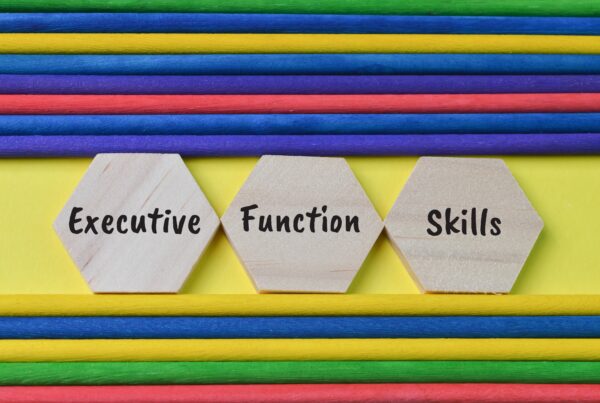When we hear “executive skills”, we may think of skills related to being the executive of a company: organization, time management, and planning/prioritization. Executive skills are necessary for all humans, not just CEOs, but our executive function skills are pretty much the “CEO” of our brain: they dictate our ability to organize, manage time, and plan, among several other executive functions. If we have deficits in one or more of these skills, we will struggle with everyday tasks and activities.
The 11 executive functioning skills are:
- Response Inhibition
- Working Memory
- Emotional Control
- Flexibility
- Sustained Attention
- Task Initiation
- Planning & Prioritizing
- Organization
- Time Management
- Goal-Directed Persistence
- Metacognition
These skills develop over time: As children, our parents manage a lot of these tasks for us. Our parents will keep track of our schedules, remind us to clean up after ourselves, and help keep us on track toward our goals. As we get older, we start taking on these responsibilities for ourselves. But these are skills, just like any other skills in sports, music, or school: they must be learned, practiced, and mastered. Anyone can have weaknesses in one or more executive functions, either from some sort of neurodivergence (e.g., ADHD and sustained attention) or simply from a lack of practice or understanding of the skill.
Executive Functioning Skill Deficits May Look Like:
Procrastination: Sitting on your phone, fully aware of a pending task but struggling to initiate it – likely accompanied by distress at being unable to start the task.
Forgetfulness: Holding an item (e.g., keys) one moment, only to have it mysteriously disappear and later found in an unexpected place (e.g., in the fridge).
Disorganization: Being appalled by the level of messiness in your room or car, but also being too overwhelmed to clean up.
All of these are examples of how some executive skill deficits (specifically, task initiation, working memory, and organization) can manifest in our lives.
An Important Note:
It’s crucial to recognize that executive function deficits are not laziness. Rather, they signify differences in brain structures and functions. While someone struggling with executive functions may appear disorganized or unmotivated, it’s essential to understand that these challenges are rooted in neurological variations that affect the ability to plan, prioritize, and execute tasks efficiently. Reframing the conversation around executive function deficits as differences in brain structure helps foster empathy and an accurate understanding of the unique cognitive processes individuals navigate.
How Do Executive Functions Affect Students in School?
Executive functioning skills are crucial to academic success. Skills like organization, planning/prioritizing, and time management allow students to organize their assignments, figure out what to work on first, and get all their assignments in on time. Working memory allows students to successfully complete tasks, like math problems or reading comprehension assessments. Response inhibition, flexibility, and emotional control contribute to a student’s demeanor in class and allow the student to handle the day without outbursts. Goal-directed persistence and metacognition allow students to see their long-term path forward and adjust their path to stay on course toward their goals.
How Do Executive Functions Affect Students Outside of School?
Executive functioning skills play a big role outside of schools as well. Keeping a clean bedroom, completing chores, and getting to obligations on time requires skills like organization, planning/prioritizing, and time management. Working memory allows students to successfully keep track of their belongings. Weaknesses in response inhibition, flexibility, and emotional control could be behind emotional outbursts or frequent fights with siblings.
How Do Executive Functions Affect Adults?
The consequences of weak executive function skills are much more severe for adults. Missing assignments in childhood can turn into a notice from a collections agency from an unpaid parking ticket or bill. In-class outbursts can turn into road rage or outbursts at work – in front of a boss. Being late to school can turn into missing college classes entirely or getting fired from a job for tardiness. After high school, the people around us are much less likely to accept the effects of executive skill weaknesses than our teachers and parents have in the past.

What Does Executive Function Coaching Look Like?
Initially, there will be a meeting with the student, parent, and coach to discuss and assess the student’s executive function skills. This meeting involves discussion, interviews, and written assessments for both the student and the parent. By the end of the meeting, the coach will have a clear assessment of the student’s executive functioning skills and be able to identify goals for the student moving forward.
Next, there will be a meeting between the student and coach to identify which goals to start working on and develop an initial plan. The student will meet with their coach frequently to learn new skills, keep track of progress, adjust the plan as needed, and ask questions or receive feedback.
Do I Need Executive Functioning Coaching?
If you’re not sure if you or your child would benefit from executive functioning coaching, take a look at the short questionnaire on our executive coaching page to see if you recognize any of the signs of skill deficits. If you’re not still sure, reach out to Hailey or Jamie to talk about it!
Resources:
The Smart But Scattered books are great resources for understanding executive functioning skills and supporting your child with developing those skills. It outlines how to have difficult conversations in the space and how to help your child with incentivization.
The leading ADHD organization, CHADD, also has many free resources and blogs on executive functioning.
Summary
In conclusion, mastering executive functioning skills is essential for navigating the complexities of our fast-paced world. Executive functioning is not a fixed trait but a set of skills that can be developed and refined over time. Mindfish’s coaches understand the unique challenges individuals face in today’s dynamic environment and provide tailored coaching to enhance executive functioning skills. Our expert coaches work collaboratively with clients, offering personalized strategies, tools, and systems to improve time management, organization, problem-solving, and more. Whether navigating the complexities of work, academics, or daily life, Mindfish’s executive functioning coaching emerges as a powerful tool for unlocking untapped potential and fostering personal growth.
If you are interested in our executive functioning coaching, reach out to Hailey or Jamie!
Interested in learning more about Test Prep at Mindfish?
Contact us today to find out what our dedicated tutors can help you achieve.





